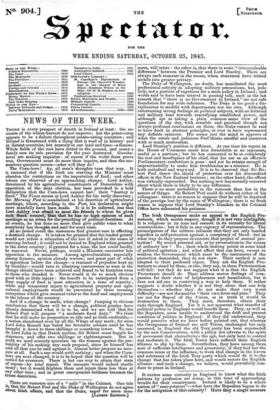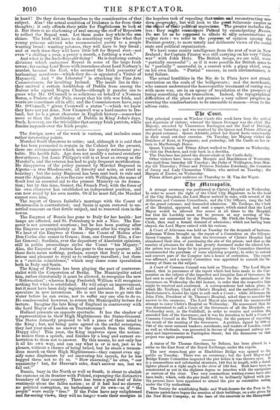It excites some curiosity in England to know what the
Irish patriots by profession are doing, in this time of approaching trouble for their countrymen. Ireland is likely to be a whole nation of " sans-potatoes —what have the Replers begun to do for the mitigation of that calamity? nave they a single measure
in hand? Do they devote themselves to the consideration of that subject. Alas ! the actual-condition of Irishmen is far from their thoughts ; it only offends their pride for Englishmen 'to 'look at it. But there is no slackening of zeal among the staff of tepealsrs to collect the Repeal rent. Let them make hay while tthe sun shines. The Irish will have to do something very like what that young princess advised who recommended pastry to a people -wanting bread : wanting potatoes, they will have to buy bread ; and at such time they will have little left for Repeal rent—not even "a shilling a year, a penny a month, a farthing a week."
And what is the Arch-Repealer doing ? He is deploring certain divisions which embarrass Repeal in some of the large Irish tOwns ; favouring Lord Bosse with inuendoes about Lord Norbury's murder, because the Earl, who accused the Irish peasantry of harbouring murderers—which they do—is appointed a Visiter of Maynooth. And " the Liberator" is attacking the Fine Arts Commissioners, for insulting Ireland. The insult lies in this : they omitted a certain Archbishop of Dublin from among the Barons who signed Magna Charta—(though it puzzles one to guess why Mr. O'Connell is so solicitous on behalf of a Norman Baron, a Prelate of the Pale, except that his title was Irish, and words are sometimes all in all); and the Commissioners have, says Mr. O'Connell," given Cromwell a statue "—which we know they have not yet done. Now Cromwell was a hard master to Ire- land, but he is a great character in English history—somewhat more so than the Archbishop of Dublin in King John's days. Such, however, are the trivialities that occupy Irish patriots, while famine impends over the Irish people.



























